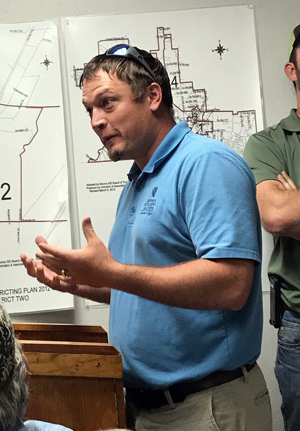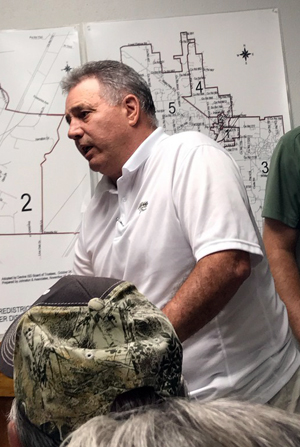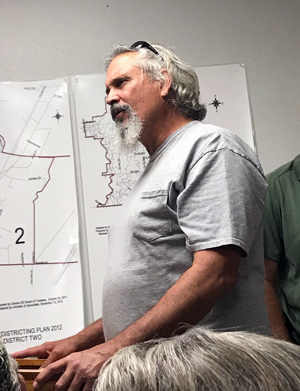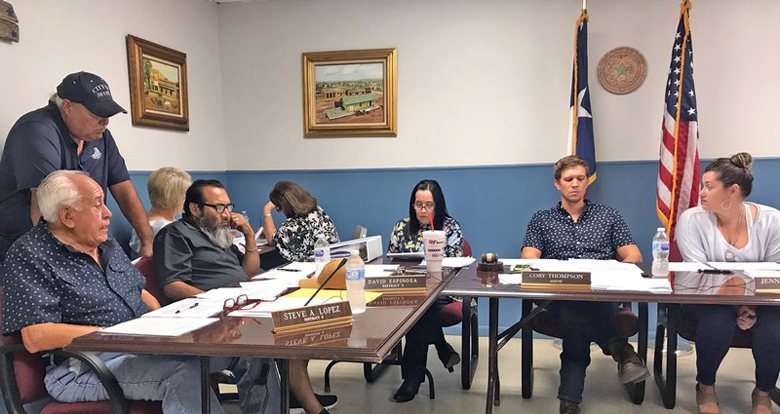The question of what to do with the Devine Municipal Golf Course, which has cost the City of Devine $1.3 million since its acquisition in July 2018, loomed large in the budget workshop held during a packed Special City Council meeting on Tuesday, August 27.
Interim City Administrator Dora Rodriguez presented Council with a projected budget for fiscal year 2019-2020 that included $638,563 for the golf course’s day-to-day expenses, a figure that does not include the cost of reconstructing the greens, estimated at around $1.5 million, or renovating the clubhouse, which is currently capped at $350,000 but estimated to cost over $400,000.
The course currently has fewer than 40 members and is projected to bring in less than $100,000 in revenue in the next fiscal year.
District 3 Councilman David Espinosa said that the people in his district that he’s spoken to about the golf course are not in favor of it.
“And the reason being because they’re not interested in golf,” Espinosa said. “That’s just the response that I got from them overall, in general.”
District 4 Councilwoman Jennifer Schott said she’d received mixed feedback from her constituents. While some expressed support for the golf course, many did not.
“I will say that none of them, none of them, said, ‘Yes, I think we should continue down the road we’re going,'” Schott said. “And then I got, clearly, most of them were like, ‘No, why would I want, why would I choose to spend that amount of money on just the golf course?'”
District 2 Councilman Steve Lopez said seventy percent of the people he’d spoken to, both in his district and overall, are in favor of keeping the course running.
Schott clarified that her earlier comments had been specific to District 4.
“I have spoken to many other people that are not in my district that obviously are for the golf course,” Schott said, “but I feel like a lot of those people do not – they haven’t been showing up until tonight, so a lot of them are unaware of the true facts and what it’s been costing.”
Schott added that she is not against the golf course, but that it’s not working as currently conceived.
“So I am open-minded to options, and for us as a community and a Council to explore all of those options, like the original motion was when the City took it back,” Schott said. “But it is not an option for me, I feel, to continue, and y’all know that, to continue exactly the way that we’re going with this budget right here. Not an option.”
Espinosa said he wanted to see the golf course continue, but that he would like to see other sources of income.
“Hopefully we can explore those and help us long term,” Espinosa said.
A number of citizens in the audience took the opportunity to address Council with questions and concerns.
“I would say this budget is a budget, but if we don’t have a plan, various options and strategy, both short- and long-term, we’re going to fail,” George Valdemar said, asking for a three-year plan for the City. “It’s been one year since the golf course was taken over, you’re going to be in the negative. Anybody who runs a business knows you’re going to be in the negative.”
Schott said she agreed that there needed to be a plan of action.
“I have asked for that since day one of taking this over, and it hasn’t happened,” Schott said.
“Whose responsibility is that?” Valdemar asked.
“I have asked our leadership numerous times for a plan as to how they plan on recouping money, and I have not yet received that,” Schott replied.
Valdemar clarified that he wanted a plan for all the issues, not just the golf course. Schott agreed but said that was another subject.
“No, it’s not another subject, it’s the City,” Valdemar said. “We’re all invested in all issues. I’m asking if I can see the three-year forecast for all issues, not just the golf course, and a plan behind this. If we don’t have a plan, we are going to fail.”
Parks Board member Mary Allison stressed the need to bring in industry with a tax base in order to provide amenities that residents want.

Kiel Boehme said that people go negative on the golf course without trying to think of ways to utilize it for a return on the City’s investment.
“Everybody says there’s no ROI, there’s no ROI,” Boehme said. “Parks have no ROI. Where are you going to make money on a park?”
When Schott pointed out that a park doesn’t have the same kind of expenses as a golf course, Boehme agreed, but said the course’s amenities had to be factored in.
“You’ve got to consider the clubhouse hosting events,” Boehme said. “I do understand all the money you’ve spent, but how much money have you spent on advertising the course since you took over? On advertising and getting people to come and play?
“All I’m saying is, when you start bashing the golf course, consider other options that you might do that would make money. I have not heard one yet that would bring ROI that you were talking about.”
Schott repeated her point that a park wouldn’t have $638,000 in expenses.
“It’s not so much that I don’t want to spend that money, it’s that I look at the deficit at the end of the day,” Schott said. “That’s what I look at, not the actual money.”
“Have you guys considered talking to other towns and asking them if they are running a profit on their parks?” Boehme asked.
“I have asked for a plan,” Schott replied. “I have asked for a plan. I’m not against it. But since we’ve had this, I don’t have confidence in the City that they are going to be able to run the golf course like you’re envisioning. Clearly. That’s why we’re here.”
Lucas Gordon, who works at the golf course, pointed out that some of the expenses such as new equipment are one-time purchases that won’t carry over to another fiscal year.
“The people that I see every day out there, they’re happy, they’re living their lives,” Gordon said. “Bringing their kids out, riding their kids around, feeding ducks, little things like that. It would be sad to see it go to someone else where it would be a lot different.”
Thompson clarified that one-time purchases are not figured into next year’s proposed budget.
“The one-time items are done as a separate expense that the City [Council] has to approve every time we get to these,” Thompson said, adding that it costs the City over $2,500 to open the golf course each day.
Schott returned to Boehme’s comment about negativity directed toward the golf course.

“These numbers aren’t going to work,” Schott said. “So why don’t you guys come up with options? We want this, how can we make it work? How is this going to work? Because this, coming up here and saying, ‘I want the golf course,’ that’s not going to make it work.”
Thompson said that if the City continued on its current path, it would have to take out loans.
“And obviously we are not making that money back to pay back those loans,” Thompson said. “I don’t know how we’re going to pay back those loans to keep the doors open.”
Former District 4 Councilwoman Kathy Wilkins asked how many members the golf course needed to cover $638,563 in yearly expenses.
“How many years do y’all think it’s going to take to get that money back?” Wilkins asked. “Is the City going to go in the hole over that? Do y’all want that?”
“That’s why I said the City will have to go with loans,” Thompson said. “Which means that yes, that is technically in the hole.”
Richard Brent Haass suggested charging green fees of $19.99 every day, not just on Fridays.
“Charge that every day, advertise it as much as you can, and you will draw people back to this golf course,” Haass said. “Because right now I play Pleasanton, I play Bandera, and I play Castroville, and it’s about thirty dollars to play, and that’s what we’re charging. If we can undercut those courses, we will get people to come back.”
Laura Sinclair said the course was a business, and the City had a product and service to sell.
“Our products went down,” Sinclair said, “but if we can get these greens back up in shape, and it’s coming around much better, you can recover.”
Scott Grego was the Superintendent at the Dominion Country Club in San Antonio for seven years and said $638,000 seemed high.
“I spent $725,000 annually to maintain Dominion,” Grego said. “I would not rebuild the greens. I would regrow what is already there and take the money.”
Schott said that every other golfer had indicated that the greens were a problem.
“Well, they’re horrible,” Grego said. “I played them Father’s Day, but there’s a way to make them better versus spending the $1.5 million redoing them.”
Grego later added that he knew people who would be interested in taking the golf course off the City’s hands.
Laura Hart asked if Council had considered creating a committee to explore options for the course.
“You know, we just heard a lot of good information tonight,” Hart said. “That could look at the maintenance, the clubhouse improvement, and ways to lower costs.”

Former Devine Golf Association Board member Jeff Wisenbaker said that he is an agronomist with knowledge about growing grass and had things to share with the City but had been turned away.
“Some comments have been made over time against the DGA that I don’t think are proper,” Wisenbaker said, and expressed frustration with the one-minute time limit that Thompson had imposed for citizens’ comments. “But the thing is, is that if you want good ideas, then let’s sit down and give some of us the time to speak. I think this is worth it.”
Wisenbaker also asked for a copy of the golf course budget, and said he was in line with Grego on what the cost of operation should be.
Jessica Ornelas expressed frustration that the City was spending money on the golf course but not on Little League or DYS.
Jerry Stevens said the City needed a plan and had priorities other than the golf course.
“I’m just saying there’s a lot of things in this town that we need to be doing instead of us fighting here about that golf course,” Stevens said. “If there’s somebody out there that’s willing to take it over so that we can get beyond this so we can take care of our city and grow infrastructure, whatever we need to do in this town, that’s what we need to do, because right now we’re just stagnant, we’re just hitting a brick wall.”
Mike Nicholson said he lives on the golf course and loves playing golf, but that spending two or three million dollars didn’t make sense.
“The biggest thing there is lack of experience, lack of knowledge about running a golf course,” Nicholson said. “Since y’all have taken over, have y’all advertised the golf course? You build it and they will come, that does not work nowadays. You have to advertise it.”
Richard Chalaire said he didn’t understand why the City had taken over the course.
“You could have Googled, ‘what does it cost to run a golf course?’” Chalaire said. “You couldn’t even maintain the parks right now, the roads are terrible, and you thought you could take on the responsibility of the golf course? That speaks to mismanagement.”
Schott said she voted to take over the course because it was in the bylaws for the City to take it back, but that her intention had been to try and outsource it.
“So can that occur now?” Chalaire asked. “Is that even legal now? If you had to take it, don’t you have to maintain control?”
City Attorney Tom Cate explained that the DGA’s bylaws stated that if it ever folded, its assets were to go to the City, and that Council had held a Public Hearing on the issue.
“And all of the people who were there, they were in favor of keeping the golf course, of the City taking over the golf course and continue the operation of the golf course,” Cate said. “The City Council made the decision, the policy decision, at that time to take over the golf course and to explore other ways to keep the golf course running. And that’s what they’ve done. And now we’ve got to this point where they’re seeing that it’s costing a whole lot more money than what they had expected.”
Chalaire said the costs should have been anticipated, and that the DGA Board voted against giving the course to a private entity willing to take it over.

Both the DGA Board and Council rejected offers to take over the course from an investment group led by Tommy Ramirez.
“We have had I don’t know how many meetings this past year-plus since we’ve taken it over,” Thompson said. “I really wish that certain people who are in our ears tonight would have come to those other meetings and expressed that then.”
Chalaire said that Thompson had just posted his letter on Facebook (see article in the August 28 edition of The Devine News), “and you said you’re shocked by the numbers. This is new information to you. I’m under the understanding that everything’s going along normally.”
Thompson said there were certain things that Council did not have.
“But as far as what was public and what was not public, we are still dealing with items that were not public that came about,” Thompson said. “So no, it was not all public information.”
Another budget workshop was set to be held during the Special meeting scheduled on press night on Tuesday, September 3.
The next Regular Council meeting is Sept. 17.
By Marly Davis
Staff Writer
